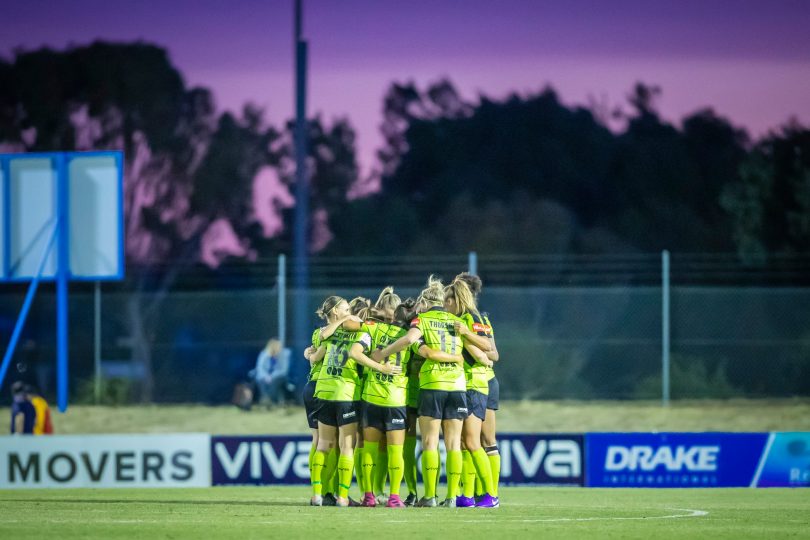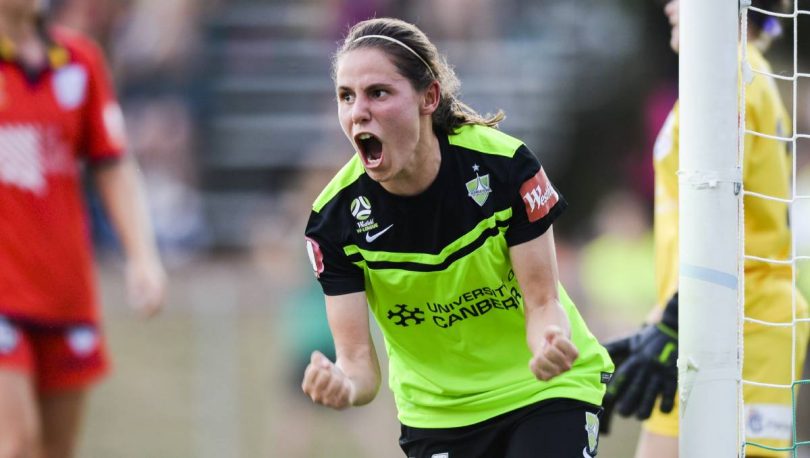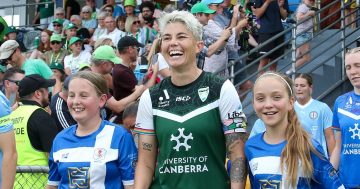
Canberra United is under threat. Photo: Canberra United Facebook.
It’s hard to comprehend how Canberra United could be in danger of being no more.
It’s also difficult to gain a complete understanding of exactly how we have come to this point.
Canberra United, two-time champions and a foundation club in the original W-League (now A-League Women), appears to be caught in the middle of uncertainty.
The Australian Professional Leagues are attempting to secure a financial backer for an A-League Men licence in Canberra.
That is no small ask, with the APL seeking $25 million for a licence for the new club. Thanks to a billionaire backer, Auckland will be one of the new expansion teams after coming up with the funds.
In Canberra’s case, finding a similar backer has so far proven elusive. Sources tell us almost every week that an announcement is imminent, but nothing has happened, resulting in pessimism about the required funding.
The problem for Canberra United is the APL’s assertion that the licence for the A-League Men also includes taking over the running of the women’s A-League program.
Capital Football has been the financial backer of Canberra United since 2008, but there appears to be uncertainty over Capital Football’s ongoing commitment due to rising costs.
It’s noteworthy that Canberra United is the only team in the A-League funded by a state or territory association. All other clubs are run by an A-League licensee, which also operates a men’s side. So Canberra United is swimming in a sea of uncertainty.
The ACT Government has already been approached about its appetite to put more funds into Canberra United if there is no A-League Men’s licence and Capital Football cannot commit to the team’s financial backing.
The government’s response is that it already contributes $250,000 to the Canberra United program and has made no commitment to put more ACT Government money into the team.

Ashleigh Sykes took to social media to express the frustration of many with the current situation. Photo: File.
Former Canberra United and Matilda’s player Ashleigh Sykes went on social media to express her frustration at the impasse, expressing frustration at the level of government funding for the A-League Women team when compared to the funding allocated to the Greater Western Sydney AFL team.
She wrote: “Certain it’s not just players but also fans of Canberra United who would like to see movement on this soon. Indecision and lack of direction has seemingly left this foundation club and a mainstay of the women’s game in a difficult position. Frustrating. Won’t participate in bidding for the massively successful home WWC [Women’s World Cup] that finished eight months ago, or increase investment in a local team off the back of that. Will continue to pay about 2.8m a year for an AFL team to play three games in Canberra.”
If Canberra United were to fold, it would be a travesty, not just for women’s football in the ACT but also for the wider sporting community in the region.
It would create the impression that, as a community, we have been unable to support one of our most successful women’s sporting teams.
As a community, we have taken pride in the success of our women’s sporting teams and it has contributed to the psyche of the city.
If Canberra United is wound up, what would happen to the pathway for young players? Will they be forced to relocate to chase their aspirations?
When the Canberra Raiders faced financial stress in 1991, the ‘Save the Raiders’ fund was launched. The community and businesses dug deep to secure the team’s future.
Perhaps similar action may be called for to save Canberra United. As a community asset, we can’t afford to lose it.



















